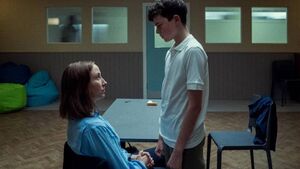Lessons must be learned from 'Adolescence'

Erin Doherty as Briony Ariston and Owen Cooper as Jamie Miller in the Netflix series, 'Adolescence'. Picture: Courtesy of Ben Blackall/Netflix
It would take a particularly cold-hearted individual to watch the final episode of the acclaimed Netflix drama and not find it heartbreaking.
I won’t lie – I was a blubbering mess watching it. It was one of the most powerful and sobering pieces of TV I have ever seen. I won’t spoil it for those who haven’t seen it but anyone I’ve spoken to who did watch it had a similar, moving experience. You should watch it if you haven’t already.
The drama follows the arrest of a 13-year-old boy accused of murdering a classmate and shows the devastating impact on his family and community.
At its core, shows the dark world of smartphones, social media and bullying that can visit any home. The family in were the epitome of normality in so many ways with just a few, human flaws.
What it has done is provoke widespread discussions about the perils of smartphones and social media among our youth. And not before time.
Children in national schools owning their own smartphones is becoming increasingly common. Unregulated use of such phones by kids and teenagers is all too common as well.
The refrain from the parents in that their son was just in his room reveals the dangers that can take place inside the apparent safety of your own home if your child has a smartphone and no limits on it. The parents in clearly had no limits on their son’s phone use and they are far from isolated.
Right now I see three particular issues with children/teenagers and smartphones. First is the age at which a child receives a phone, something that has been creeping stealthily lower and lower. Second is the limits or, often, lack of limits/regulation of phone use by parents once their child has a phone. And thirdly is wider issues like a lack of enforcement and concern from social media giants where issues arise and a systemic failure of governments all over the world to tackle and regulate this burgeoning problem.
Getting a child their first phone represents, to me, the end of their childhood and innocence. It is something that ought to be held off for as long as possible. Right now, succeeding in holding off until your child enters secondary school is about as far as you can expect to go.
Many parents cave before then – and it is often very understandable. Someone else in their child’s class will have a phone, and so the peer pressure will start. More and more kids will get phones, and then those without one become isolated and can legitimately ask their parents about the fairness of their friends having one while they have to ‘make do’ with TV.
Hold off into secondary school and that isolation of your child, who may be one of less than a handful in a year of 100 children without a phone, really does risk isolating them from their peers.
There are parent-led groups in Ireland who are campaigning in their communities for ‘phone-free childhoods’ – that is to say that children in their area’s national schools would not have a phone until secondary school. It has proved effective and creates cohesion among parents. When there is an across the board standard, it is harder for any parent to break it and very easy for them to explain to their child why they cannot have a phone until secondary school.
There will come a time – and it cannot happen soon enough – when this will be legislation. For now, parents are left to do their best in trying circumstances.
The next strand is what to do when the child has a phone. It was part of a discussion on the on Midwest Radio last week where parents phoned in about issues raised in .
One mother detailed how their teenage children are allowed their phones for two hours a day during the week and three hours a day at weekends, never in their bedrooms and the phones are linked to their father’s so he can monitor what they are doing.
While part of that may seem to some like an invasion of privacy, when you consider the risks and dangers online nowadays, it is most certainly the lesser of two evils.
Far too many parents do not police phone use adequately – many of them are simply overwhelmed.
In 2024, a survey carried out by the polling firm Amárach, on behalf of Irish charity CyberSafeKids, showed in technicolour the extent of the issue. It found that over half (52%) of parents do not feel confident about how to teach children how to stay safe on the internet. Almost half (45%) of 10-year-olds with smartphones are allowed to use them in their bedroom. Just over one in four parents surveyed (28%) used parental controls yet only one in five (20%) felt the good the internet could bring their children outweighed the risks.
Chief Executive of CyberSafeKids, Alex Cooney said the survey identified a ‘worrying gap between children’s access and their parent’s ability to support them to be safe online’.
What are the risks?
Well, as most of us are aware, the internet and social media can be very beneficial but is full of dangers too. Unregulated access by children and teenagers opens the door to harmful and inappropriate content including violence and pornography; the risk of predators impersonating other children duping children into sending inappropriate images online; bullying through social media; poor if not altogether non-existent enforcement of inappropriate content, abusive content and defamatory comments by social media companies.
That’s before you mention the damage overuse of phones causes to attention spans and how addictive they become for many children. Social media engagement becomes a popularity contest with many kids left isolated.
Governments the world over have either been very slow to act or are simply unwilling. Donald Trump has played to a particular base by elevating transgender issues far beyond the extent of their reach and import.
Yet there has not been a peep out of him on the ills of social media. His anti-regulation approach to social media sites has been music to the ears of tech bros like Elon Musk and Mark Zuckerberg but here is an issue on which much greater intervention is required by world leaders.
It an an issue that affects every single parent of minors in the world and right now in Mayo, in Ireland and throughout the world, it is one we are sleepwalking through.
I think we will look back on this period in our history and ask ourselves serious questions about what we allowed to happen as parents and as a society on our watch. And just hope that issues like those in don’t come to our door.





